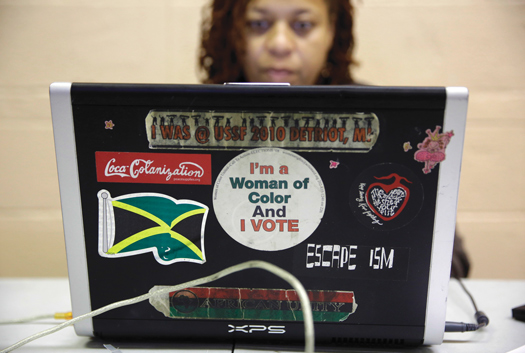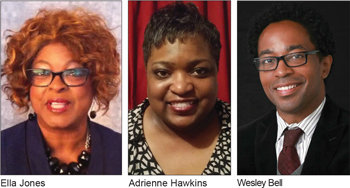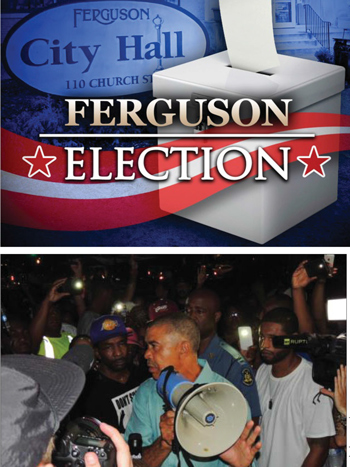Voting, keeping the faith and fighting for change in Ferguson
By J.A. Salaam | Last updated: Apr 7, 2015 - 7:47:20 PMWhat's your opinion on this article?

In this photo made April 3, Juju Jacobs, an organizer with the Organization for Black Struggle, works behind a computer as she prepares to send volunteers out to canvass neighborhoods urging residents to vote in Ferguson, Mo. Residents are preparing for an election April 7when three of six city council seats will be decided. Photo: AP/Wide World photos
|
FERGUSON, Mo. (FinalCall.com) - Over the last eight months turmoil and tensions between Blacks and Whites here increased tremendously after the death of Black teenager Michael Brown, Jr.
The city is divided by economics, politics and race, where the majority population of 22,000 residents is over 65 percent Black. Yet there are only three Black police officers out of a force of 53, one Black among six city council members, Ferguson has a White mayor, a White city manager, a White police chief, a White fire chief and just seven percent of firefighters are Black.

|
These numbers have been constant for many years but recently questions have been raised about White minority rule in a majority Black suburb. With residents voting April 7 there were four Black candidates for two open seats on the city council. This election had more Black candidates run for office than any election in the past 121 years. There have never been more than two Blacks on the city council at the same time. There are six city council members. Black candidates in this election included Ella Jones, Adrienne Hawkins, Wesley Bell and Lee Smith.
Congressman William Lacy Clay and members of the Congressional Black Caucus came to Well Spring Church April 4 encouraging residents to get out and vote. They stressed the importance of the city council’s role in governing and hiring those involved in municipal administration and law enforcement.
“Local government plays a role in people’s daily lives and part of the problem here in Ferguson, local government was not reflective of the entire community,” said Rep. Clay.

Congressman William Lacy Clay marching for justice for Michael Brown and his family in Ferguson, Mo.
|
Many Blacks live in the worst areas of Ferguson and face joblessness, while some homeless children live in abandoned buildings and others simply walk city streets.
Ferguson often looks like a war zone in the aftermath of the non-indictment of former city police officer Darren Wilson for killing unarmed Michael Brown, Jr. Will more Blacks on the city council make a noticeable difference in the conditions Blacks face in Ferguson?
“Ferguson needs to execute an economic development plan which reflects the demographics of the community. If we can feed and employ ourselves, and meet our basic needs, we will thrive as a community,” city council candidate Hawkins said. She believes economics is key to moving the city and Black people forward. She has also crafted an economic development plan.
In about 250 days since the killing of the unarmed teenager, there have been protests, abuses of demonstrators by police, the shooting of two officers, civil unrest, isolated looting, National Guardsmen, tear gas canisters and rubber bullets fired on the streets of Ferguson.
The powerful and sometimes painful images of young people, men, women and children in the streets marching day after day and demanding change has fed a spirit to stand against injustice that has spread across America.
“Out of a tragedy comes an opportunity, we have a chance to set a broader example across the country, because what happens in Ferguson will have a positive rippling effect not just for Ferguson city but the world. This time that we are living and experiencing in Ferguson will be recorded in our children’s history books and we have to take advantage of it,” said candidate Bell, who is an attorney.
“The question is are we going to come together or keep throwing stones? We must have solutions to the problems we are faced with. We as a people must come together and make the changes we need, starting with community-oriented policing and civic neighborhood revitalization. So when people in the community feel valued they will make the necessary changes to improve their condition,” he said.
Activist Melissa McKinnies, who has been a regular in street protests, concedes voting is important—but she doesn’t see voting as the only solution.
“In Ferguson it was bad what happened there. I marched, I cried and was right there in the midst of it. And now we have a chance to impact a system from the inside,” she said.
“But will that stop the crime against us? No. It’s time that we stop pointing the finger at what others have been doing to us. If we are going to stop the violence of the police, we must first stop it with ourselves,” she added. The activist was pushing an April 11 Stop Black On Black Crime rally in nearby St. Louis City to bring religious and community activists, Muslims, Christians and leaders to come out and show unity.
“Voting is great and it serves its purpose but we will not get any better until we recognize what we need to do first towards each other. We don’t need to keep saying ‘Stop the Killing,’ we need to start saying ‘Start the Loving.’ Black on Black love is the answer to our problem,” said Ms. McKinnies.
INSIDE STORIES AND REVIEWS
-
-
About Harriett ... and the Negro Hollywood Road Show
By Rabiah Muhammad, Guest Columnist » Full Story -
Skepticism greets Jay-Z, NFL talk of inspiring change
By Bryan 18X Crawford and Richard B. Muhammad The Final Call Newspaper @TheFinalCall » Full Story -
The painful problem of Black girls and suicide
By Charlene Muhammad -National Correspondent- » Full Story -
Exploitation of Innocence - Report: Perceptions, policies hurting Black girls
By Charlene Muhammad -National Correspondent- » Full Story -
Big Ballin: Big ideas fuel a father’s Big Baller Brand and brash business sense
By Bryan Crawford -Contributing Writer- » Full Story






 Click Here Stay Connected!
Click Here Stay Connected!








